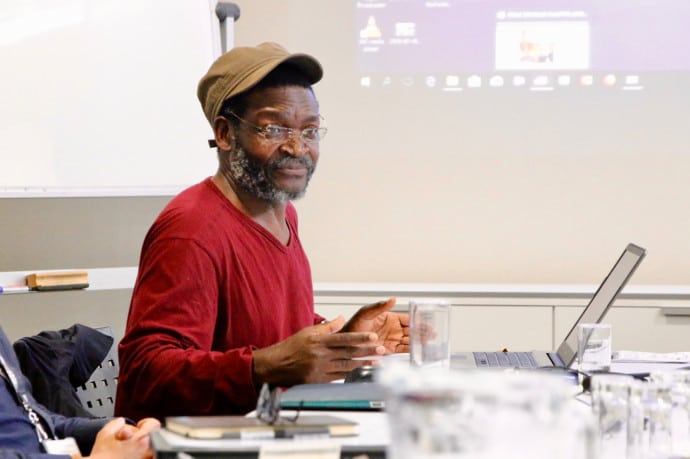“My project is an autobiography. Whilst an autobiography inevitably centres around the author, I am shying away from it being about me. I attempt instead, and hope the method will succeed, to tell the story of our people in the time that I lived, and my role, however small, in that part of our collective story. As a result, incidents and events of national importance, epochs in the history of our people, will be dealt with in some depth to allow readers to understand the significance of those events. This is to also ensure readers find the linkage of how what may have happened to a young boy in a far way village linked with the national black pain and the national struggle to end that pain. And the role of that boy in that struggle,”said Mathatha Tsedu, veteran journalist and writer-in-residence at STIAS.

“It’s always very difficult to write about me,” he added. “The only way is if while I’m inside the story I’m not the central point. The book must serve other purposes.”
“I’m running away from the intensely personal by bringing in the national issues and the history. There are children growing up who have no vestiges of what we went through – hopefully it will reach them.”
“The editor will make the decision on the need for more detail and on the sensitivity of including that detail,” he added.
Tsedu was presenting a seminar to STIAS fellows on his autobiographical book project with the working title And Still I Riseas well as presenting information on a second book which will be a collection of his columns under the title Black Eyes.
“I had struggled for seven years to get access to some of these materials,” he said. “Most newspaper houses have closed down their print libraries but during my time at STIAS the doors to the archives have opened.”
Tsedu’s autobiography will chronicle his childhood on a white-owned farm; his life in a freehold township destroyed in the 1960s during mass removals; his education; and, “my quest for reading which leads me to political literature which leads to activism that saw detention, torture, banishment and the thrill of journalism which I entered via a bottom-up approach starting as a freelancer and where I was being paid for doing what I truly loved”.
He will also trace his awakening into the Black Consciousness movement – “I am essentially a black consciousness person – not within a party, not the ANC, not the PAC” – as well his work in trade unionism through the Media Workers Association of South Africa (MWASA), and the fight for agricultural workers rights through the Farm Workers Union.
Tsedu treated STIAS fellows to a reading of the chapter entitled The Banning which covers his three-year banning/house arrest from 1981 to 1984 which preceded his eventual detention.
“The three-year ban meant I couldn’t work, go to school, attend meetings or leave the municipal district. I had to be inside between 7pm and 6am with no visitors. It’s easier to list what I could do,” he said. “The chain of slavery had become short.”
He also described the anxiety leading up to the banning when his colleagues in MWASA were being targeted one by one. “We wondered who would be next. It felt like it was a cat toying with a cornered rat – in a way it was better to get it over and done with.”
“Detention, imprisonment, torture and banishment were almost inevitable – it was like our national service.”
“But I knew I would be supported materially and financially by my comrades,” he added.
In discussion he described the hardest part of being banned as “Not being able to be a human being who walks around when he wants to.”
He also answered the question of whether he has fully recovered from these experiences as follows: “I’m not sure I am truly fine, but I have told myself I am fine.”
“The only way to survive the horror of apartheid was by being able to laugh at some things,” he added. “That was always important.”
Asked whether he would interview any of the security police or others involved he said: “No, I’m not wired that way.”
“If the mechanism for justice had existed I would have used it,’ he continued. “I didn’t go to the Truth and Reconciliation Commission – I believe as an institution it traded justice in the interest of reconciliation.”
Looking at South Africa today he said: “It’s difficult to exactly pinpoint where things went wrong. Much of the negotiations with Mandela happened while he was still in prison. By the time he was released the framework had been agreed.”
“Two important issues are the compromised land issue which means that land claims can’t predate 1913 – what about the land taken from 1652? Then there is the so-called Sunset Clause negotiated at CODESA (the Convention for a Democratic South African) which led to the creation of the TRC model and no real justice or reparations.”
“The Jewish community is still dealing with the injustices of the genocide – people are still being hunted down and put on trial. We opted to apologise and go in peace. This worked for a while in the euphoria of the Rainbow Nation but even by 1999 when Mbeki became President it was wearing thin.”
“People are questioning these issues in the streets today. They are tired of waiting and want to see the benefits of freedom.”
Tsedu is to be honoured with the bestowing of national orders on 25 April. See https://stias.ac.za/2019/04/national-orders-for-stias-fellow-mathatha-tsedu/
Michelle Galloway: Part-time media officer at STIAS
Photograph: Christoff Pauw
